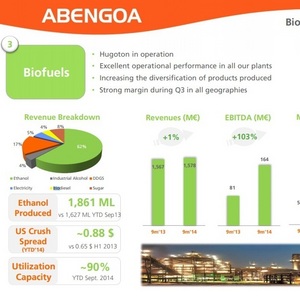Abengoa releases Q3 results, highlights Hugoton plant startup




Abengoa
November 18, 2014
BY Erin Krueger
Abengoa recently released third quarter financial results, reporting positive performance for the company’s biofuels business. For the first nine months of the year, the company reported overall revenues in line with those achieved in 2013, along with increase in net revenue and EBITDA.
For the first nine months of the year, Abengoa reported revenues of €5.24 billion ($63.57 billion), which was flat when compared to the same period of last year. EBITDA, however increased by 24 percent, reaching €1.07 billion. Net income also increased by 28 percent, reaching €100 million.
Advertisement
Advertisement
Within its third quarter presentation, Abengoa highlighted the startup of its 25 MMgy cellulosic ethanol plant in Hugoton, Kansas. The facility, which held a grand opening celebration in mid-October, will convert approximately 350,000 tons of crop residues into cellulosic ethanol each year.
During an investor call to discuss the company’s financial results, Manuel Sánchez Ortega, CEO of Abengoa, indicated the biofuels segment achieved revenues of €1.58 billion for the first nine months of the year, up 1 percent from the same period of last year. EBITDA for the segment increased by 103 percent, reaching €164 million, while margins for the first nine months of the year averaged 10.4 percent, up from 5.2 percent during the same period of 2013. Ortega said the U.S. was a key driver in the segment’s performance, noting that Brazil also performed strongly.
Overall, Ortega said Abengoa achieved good operating performance from all its biofuel plants, with approximately 90 percent capacity utilized and significantly increases in ethanol volumes produced. The company produced more than 1.86 billion liters (491.62 million gallons) of ethanol during the first nine months of the year, up from 1.63 billion liters during the same period of 2013. The U.S. crush spread was for the first three quarters of the year averaged approximately 88 cents.
Advertisement
Advertisement
According to Abengoa, 62 percent of the biofuel segment’s revenue came from ethanol, with 17 percent from distillers grains. An additional 8 percent came from sugar, with 5 percent coming from electricity. Biodiesel and industrial alcohol each accounted for 4 percent of the segment’s revenue.
Related Stories
The U.S. Department of Energy Bioenergy Technologies Office (BETO) announced up to $23 million in funding to support research and development (R&D) of domestic chemicals and fuels from biomass and waste resources.
The U.S. DOE has announced its intent to issue funding to support high-impact research and development (R&D) projects in two priority areas: sustainable propane and renewable chemicals and algal system cultivation and preprocessing.
Sens. Sherrod Brown, D-Ohio, and Pete Ricketts, R-Neb., in August introduced the Renewable Chemicals Act, a bill that aims to create a tax credit to support the production of biobased chemicals.
The Chemical Catalysis for Bioenergy Consortium, a consortium of the U.S. DOE’s Bioenergy Technologies Office, has launched an effort that aims to gather community input on the development of new biomass processing facilities.
USDA on March 8 celebrated the second annual National Biobased Products Day, a celebration to raise public awareness of biobased products, their benefits and their contributions to the U.S. economy and rural communities.
Upcoming Events










